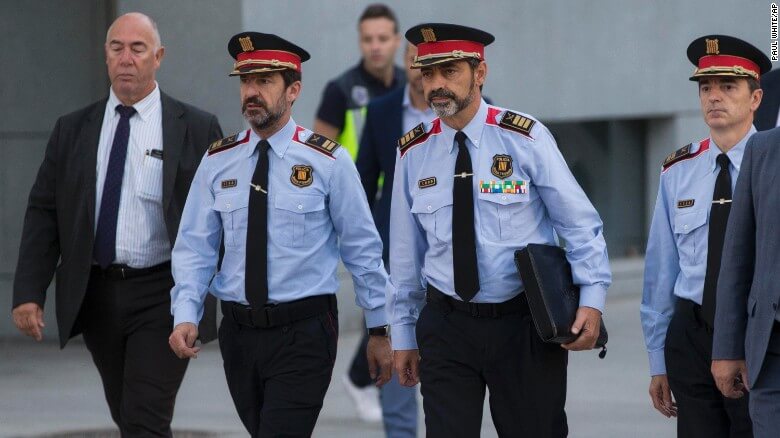Catalan Police Chief Faces Sedition Charges For Not Doing Enough To Prevent Referendum
The Catalan police chief appeared in a Madrid court Friday to answer allegations of sedition amid an ongoing deadlock after the banned independence referendum in Spain’s restive northeast region.
Josep Lluís Trapero appeared in the Spanish capital along with two leading figures in the Catalan independence movement. Spanish authorities believe Trapero’s 17,000-strong force, the Mossos d’Esquadra, didn’t do enough to prevent Sunday’s vote from taking place.
Advertisement
In Barcelona, representatives of the main political parties in Catalonia were due to meet later Friday to discuss their next moves.
The Spanish Constitutional Court banned a session of the Catalan parliament planned for Monday in an apparent attempt to prevent Catalan President Carles Puigdemont’s expected declaration of independence. A new session to debate the “current political situation” would be held on Tuesday, a parliament spokesman said.
Trapero did not speak to reporters after he emerged from court. No immediate action was taken against him, but the sedition investigation continues.
Jordi Cuixart, head of separatist group Omnium Cultural, told reporters after his court appearance that he exercised his right not to answer the judges. “I don’t recognize the authority of this court over this,” he said.
Advertisement
He criticized the Spanish state for attempting to solve a political issue through the courts. “We are convinced that, sooner rather than later, the Spanish state will have to accept dialogue,” he said.
Sánchez, president of the Catalan National Assembly, told reporters he had denied the sedition allegations in front of the judge. “We are convinced that we didn’t commit any kind of crime. I only declared in my defense to make clear the legitimacy of a peaceful, nonviolent demonstration.”
The sedition inquiry relates to violent protests on September 21 and 22 in the buildup to the October 1 referendum.
Madrid’s representative to Catalonia apologized Friday for the violence which occurred during the vote.
In the first note of contrition by a Spanish government representative, Millo told broadcaster Catalan TV3: “I insist, I’m really sorry, I want to apologize because I wouldn’t wish anything like that to happen to any person, the fact that people got hit and required assistance.”
Advertisement
Only one of the 2.2 million people who voted remains in hospital, he noted.
Millo added that there was only trouble in 13 of the 2,315 polling stations that opened in defiance of a ban. “In those 13 polling stations there were human barriers that surrounded the policemen who were unable to leave,” he said.
The Catalonia crisis is likely to be the main topic of discussion Friday at the weekly meeting of the Spanish Cabinet.
It’s not yet clear what course of action the Spanish government will take if the Catalan government goes ahead with a declaration of independence.
“I will do what’s best for Spain and when I think it’s the right time,” Prime Minister Mariano Rajoy told Spanish news agency Efe on Thursday. “I will listen to all the positions, but the final decision will be mine.”
Asked Thursday whether the parliamentary session planned for Monday would take place, Puigdemont said: “That is for Parliament to decide. But the Constitutional Court has no right to impede a democratic parliament session, which by law is inviolable.”
Advertisement
Puigdemont is expected to meet with an “independent commission for mediation and dialogue” on Friday evening.
CNN



